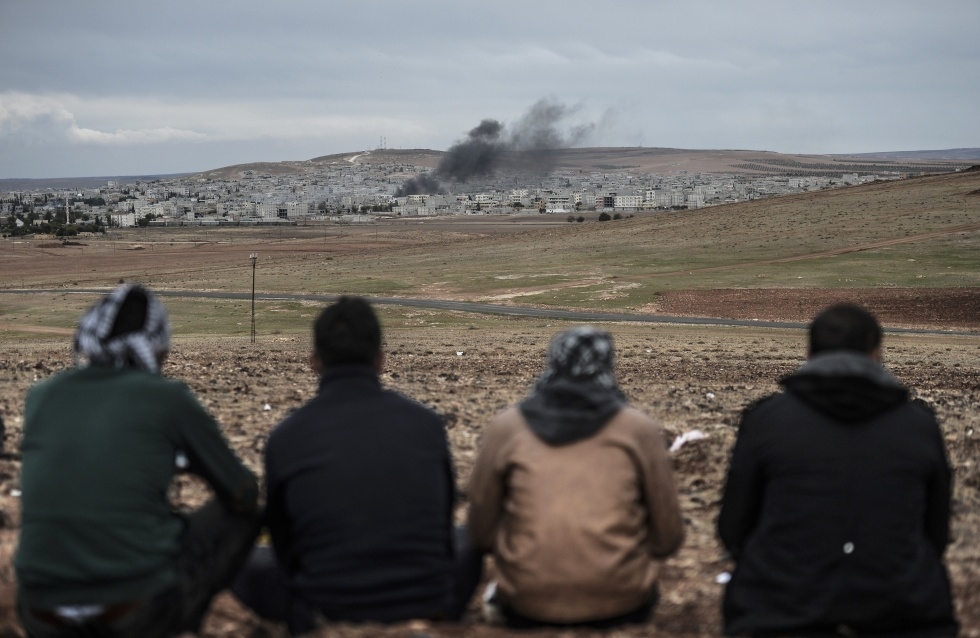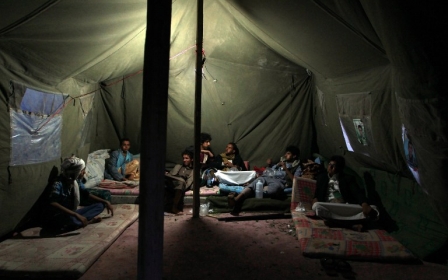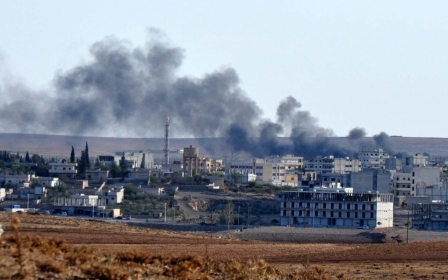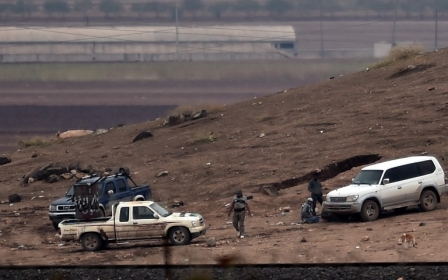US drops arms, ammunition to Kurds battling IS in Kobane

The US military airdropped weapons, ammunition and medical supplies Sunday to Kurds fighting the Islamic State (IS) group in the flashpoint Syrian town of Kobane, in a move that could anger ally Turkey.
It is the first time the US has made airdrops to Kurdish fighters defending Kobane and represents an escalation in Washington's efforts to support Syrian opposition forces against both IS militants and Syrian President Bashar al-Assad.
Kurdish forces have been under IS assault for more than a month in Kobane, which is being battled over under the gaze of the world's media that is massed just across the border in Turkey. The Kurds there were in "specific" and "urgent" need of resupply, a senior US administration official said.
Three C-130 cargo aircraft carried out what US military Central Command (CENTCOM) called "multiple" successful airdrops of supplies in the vicinity of Kobane, including small-arms weapons, provided by Kurdish authorities in Iraq.
The aircraft faced no resistance from the air or the ground. They were not accompanied by fighter jets and exited the area safely, a senior Obama administration official said. The official did not rule out a repeat operation if needed, possibly in the near future.
The supplies were "intended to enable continued resistance against [Islamic State's] attempts to overtake Kobane," CENTCOM said in a statement, which has overrun large areas of Iraq and Syria in a brutal and effective campaign.
The airdrops, which officials said were made in 27 bundles, came after IS fighters reportedly took heavy losses on Sunday from continued air strikes conducted by US-led coalition forces.
One senior US administration official said that Kurdish fighters had put up an "impressive" effort in the face of the IS organisation, but cautioned that Kobane could still fall to the militants and that the security situation remained "fluid."
American-led warplanes launched 11 air strikes near Kobane on Saturday and Sunday, CENTCOM said, helping Kurdish fighters repulse a new IS attempt to cut their supply lines from Turkey.
So far, US forces have conducted more than 135 air strikes against IS in Kobane alone.
While the resupply of Kurds in Kobane was "urgent," a senior administration official in Washington said, "of course the best way we are supporting them is with air strikes.
"We have seen our air strikes have an effect on [Islamic State]. We've seen those air strikes have an effect on the battlefield. But ultimately, we want to see those fighting bravely on the ground have the support they need."
The US military says that the air strikes have slowed the IS advance in Kobane and from Saturday into Sunday morning, 31 IS militants died in the battle, said the Syrian Observatory for Human Rights, a British-based monitoring group.
Turkey question
Washington and its Western allies have been pressing Turkey for weeks to take a more direct role in confronting the IS group in Kobane. But Ankara is reluctant to intervene militarily or to arm the Kurds, who have been historic foes demanding a separate state including parts of southeast Turkey.
Turkish President Recep Tayyip Erdogan on Sunday again rejected calls for his country to arm the main Kurdish party in Syria, describing the group as a terrorist organisation.
Asked whether the Turkish government was informed beforehand of the resupply drop, a senior administration official in Washington said President Barack Obama spoke to Erdogan on Saturday "and was able to notify him of our intent to do this and importance we put on it."
The official added: "We understand the longstanding Turkish concern with the range of groups, including Kurdish groups, they have been engaged in conflict with and in peace talks with."
However, the official said, IS was "a common enemy" for the United States and Turkey.
Washington had been in contact with Ankara in recent days to stress the urgency of the need to resupply Kurdish fighters in Kobane.
The airdrops were the fastest way to get supplies to them, one senior administration official said, "and an opportunity to strike a blow against [the militants]. When we see opportunities to target ISIL we will take them."
The Americans have been keen to stress regional involvement in the anti-IS coalition, stating the key roles being played by Gulf States in particular.
On Monday, US Secretary of State John Kerry travelled to Indonesia, home to the world’s biggest Muslim population, to urge Southeast Asian nations to increase efforts to combat the rise of IS.
Kerry was among foreign dignitaries in Jakarta for the inauguration of President Joko Widodo, a former furniture exporter who is the first leader of the world's third-biggest democracy to come from outside the political and military elites.
During his one-day visit, the top US diplomat was set to use a series of bilateral meetings to urge Widodo, known by his nickname Jokowi, and other Southeast Asian leaders to take more action against the growing threat from IS, officials said.
A senior State Department official said discussions on combating IS would be "at the top of the list" during the meetings.
"Breaking it down, the effort to combat violent extremism, to block recruitment, and to protect against the solicitation of foreign fighters," the official added.
Discussions would include efforts "to guard against the return of hardened fighters to the region, debunking and denigrating extremist propaganda, blocking illicit terrorist financing", the official said.
As well as Widodo, Kerry is due to meet Malaysian Prime Minister Najib Razak, Singaporean Prime Minister Lee Hsien Loong, the sultan of Brunei Hassanal Bolkiah and Philippine Foreign Secretary Albert del Rosario.
New MEE newsletter: Jerusalem Dispatch
Sign up to get the latest insights and analysis on Israel-Palestine, alongside Turkey Unpacked and other MEE newsletters
Middle East Eye delivers independent and unrivalled coverage and analysis of the Middle East, North Africa and beyond. To learn more about republishing this content and the associated fees, please fill out this form. More about MEE can be found here.




